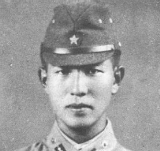
Hiroo Onoda
Overview
World War II
World War II, or the Second World War , was a global conflict lasting from 1939 to 1945, involving most of the world's nations—including all of the great powers—eventually forming two opposing military alliances: the Allies and the Axis...
and did not surrender until 1974, having spent almost 30 years holding out in the Philippines. He held the rank of Second Lieutenant
Second Lieutenant
Second lieutenant is a junior commissioned officer military rank in many armed forces.- United Kingdom and Commonwealth :The rank second lieutenant was introduced throughout the British Army in 1871 to replace the rank of ensign , although it had long been used in the Royal Artillery, Royal...
in the Imperial Japanese Army
Imperial Japanese Army
-Foundation:During the Meiji Restoration, the military forces loyal to the Emperor were samurai drawn primarily from the loyalist feudal domains of Satsuma and Chōshū...
.
Onoda was born on March 19, 1922, in Kainan, Wakayama Prefecture
Wakayama Prefecture
is a prefecture of Japan located on the Kii Peninsula in the Kansai region on Honshū island. The capital is the city of Wakayama.- History :Present-day Wakayama is mostly the western part of the province of Kii.- 1953 Wakayama Prefecture flood disaster :...
, Japan. When he was 17 years old, he went to work for the Tajima Yoko trading company in Wuhan
Wuhan
Wuhan is the capital of Hubei province, People's Republic of China, and is the most populous city in Central China. It lies at the east of the Jianghan Plain, and the intersection of the middle reaches of the Yangtze and Han rivers...
, China. When he was 20, he was enlisted in the Imperial Japanese Army.
Onoda trained as an intelligence officer in the of Nakano School
Nakano School
The was the primary training center for military intelligence operations by the Imperial Japanese Army during World War II.-History:The Imperial Japanese Army had always placed a high priority on the use of unconventional military tactics...
.
Unanswered Questions

